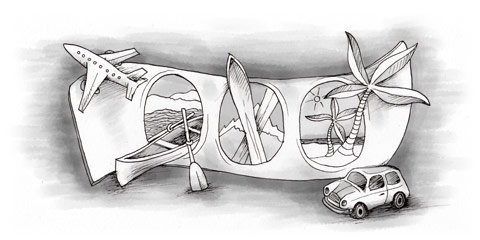The main difference from the passenger’s point of view, is that taxis can be hailed in the street and minicabs can be booked only by telephone. In addition to taxi services, many taxi and minicab companies operate private hire (e.g. weddings, sightseeing), chauffeur and courier services, and provide contract and account services, e.g. to take children to and from school. Many taxi and minicab companies provide a 24-hour service with radio-controlled cars.
Taxis aren’t particularly expensive in the UK and are cheaper than in many other European countries. London taxis (officially called Hackney Carriages) cover an area of around 1,580km2 (610mi2). Each cab has a licence number plate and the driver (cabby) wears a badge bearing his driver number. There’s a minimum charge of around £2.20 for the first 335.8m or 72.2 seconds, plus 20p for each additional 167.9m or 36.1 seconds (a lot of time is spent stuck in traffic); and once the fare is or exceeds £13.40, there is a charge of 20p for each additional 117.7 m or 25.3 seconds, or part thereof.
There are extra charges for additional passengers, luggage, and surcharges for evenings between 8pm and midnight, nights, weekends and public holidays. The fare from London-Heathrow airport (served by London cabs) to central London is around £40 - £70, for a 30-60 minutes journey. There are also business class cabs in London with more luxurious seats, soundproofing and a telephone (and higher rates than standard cabs). In rural areas, taxis charge around £3 a mile (1.6km). Taxi drivers expect a tip of around 10 per cent of the fare, although it isn’t obligatory.
If fares have recently been increased and the meter hasn’t been adjusted to the new rates, an ‘additional fares’ list is displayed inside the cab. Recommended fares for a number of destinations may be published in information booklets, e.g. the Guide to Heathrow Airport published by the British Airports Authority (BAA). Licensed taxis can ply for hire anywhere within their fare area and can be hailed on the streets, hired from taxi ranks (special waiting places for taxis), railway stations, airports and hotels, or can be ordered by telephone.
Minicabs in the UK
Minicabs usually have no meters although, if they do have a meter and are licensed by the local council, it must be set to the rates fixed by the council. If a minicab has no meter, you must agree the fare in advance when booking and confirm it before starting your journey.
Minicabs cannot be hailed in the street and it’s illegal for them to tout for business (although they do, particularly late at night). Licensed taxis and minicabs must be insured for ‘hire and reward’, which means the driver is insured to carry fare-paying passengers. If a minicab is unlicensed, it’s unlikely to be insured for hire and reward. There are no licensing requirements for minicabs in London, which means that minicabs may not be insured to carry fare-paying passengers. Local minicab companies can be found in the yellow pages.
Don’t use the services of private car drivers (always without meters) who may approach you at airport terminals or railway stations, as they’re ‘pirate’ taxis and aren’t licensed to ply for hire and aren’t insured to carry paying passengers.
When travelling with large objects, mention it in advance when booking by telephone. New ‘London-style’ black cabs are designed to take wheelchairs and are common in London and other major cities (when booking by telephone specifically ask for a wheelchair taxi, if required). In some areas, there are low-fare schemes for the elderly and disabled, using tokens or vouchers issued by local councils.
In most London boroughs, a Taxicard scheme is provided for disabled residents who cannot use buses and trains. Information about low-fare or Taxicard schemes can be obtained from local councils. In some areas, women are advised not to travel by minicab alone at night (ask the local police for advice).
Complaints
Complaints about service or hire charges can be made to the local taxi or minicab licensing office (if licensed). Complaints about London cabs can be made to the Public Carriage Office, 15 Penton Street, London N1 9PU ( 08456-027 000, www.tfl.gov.uk ). Make a note of the taxi’s licence number, the driver’s badge number, and the date and time of the incident. If you think you’ve been overcharged, obtain a receipt.
This article is an extract from Living and working in Britain. Click here to get a copy now.


